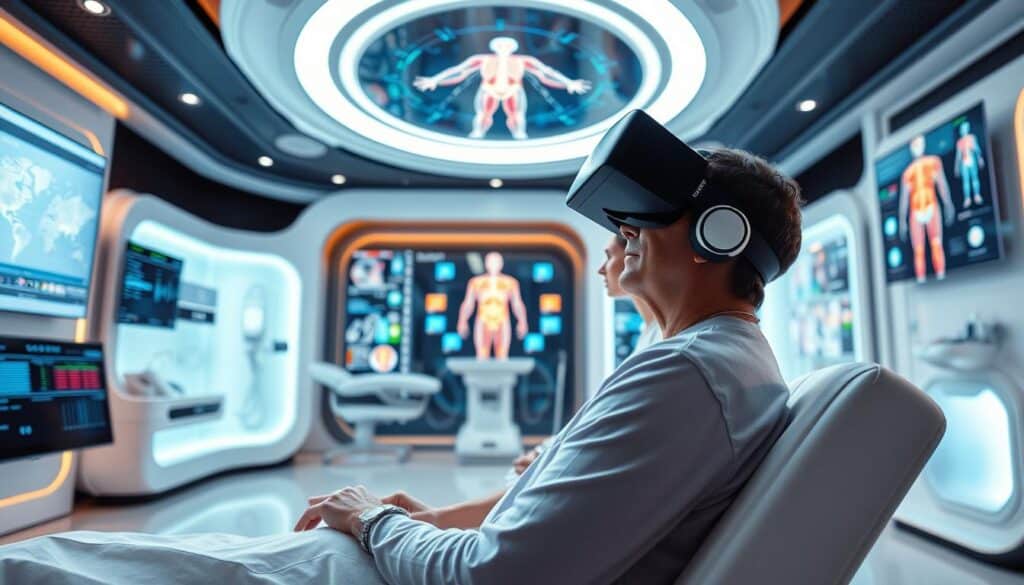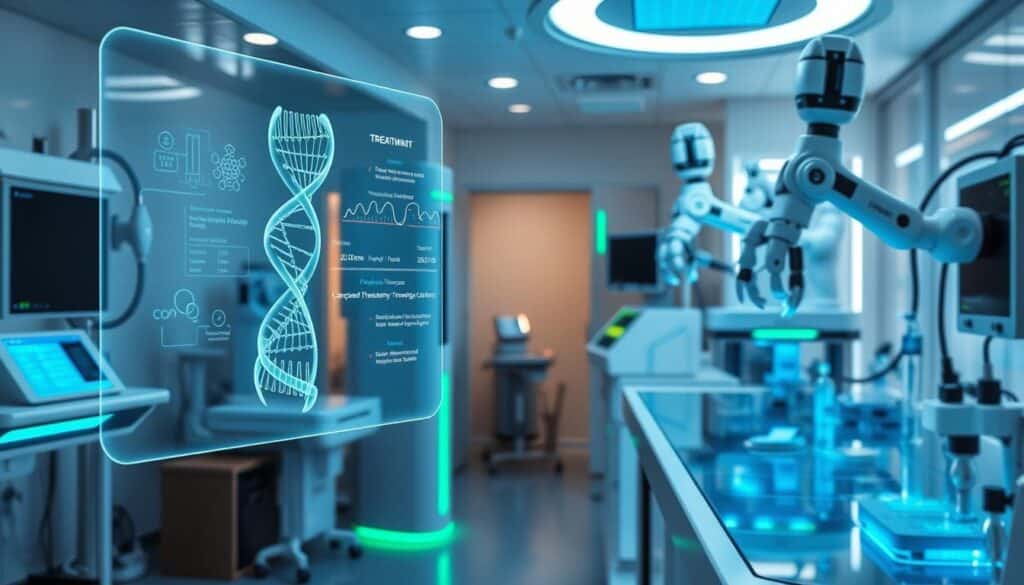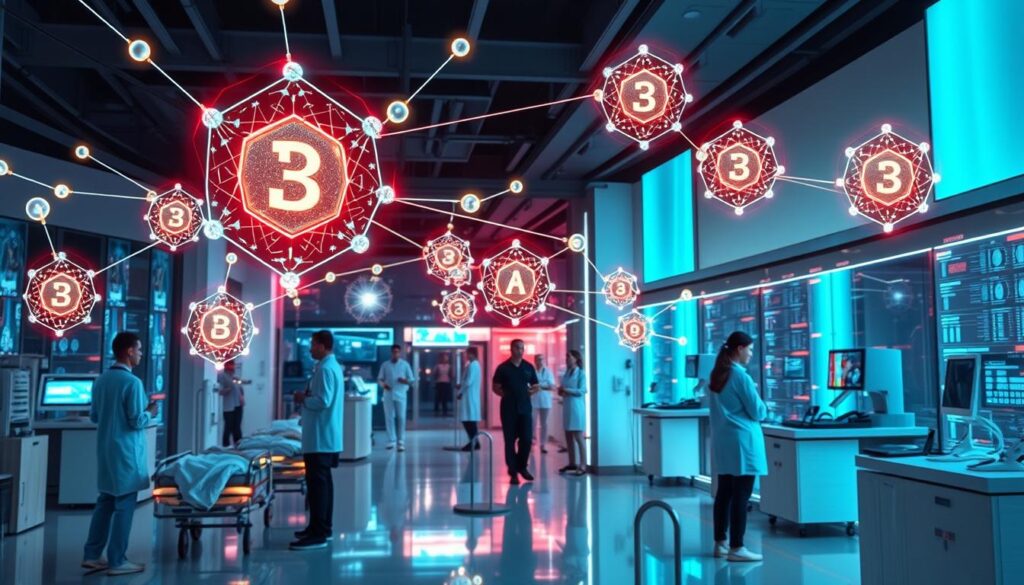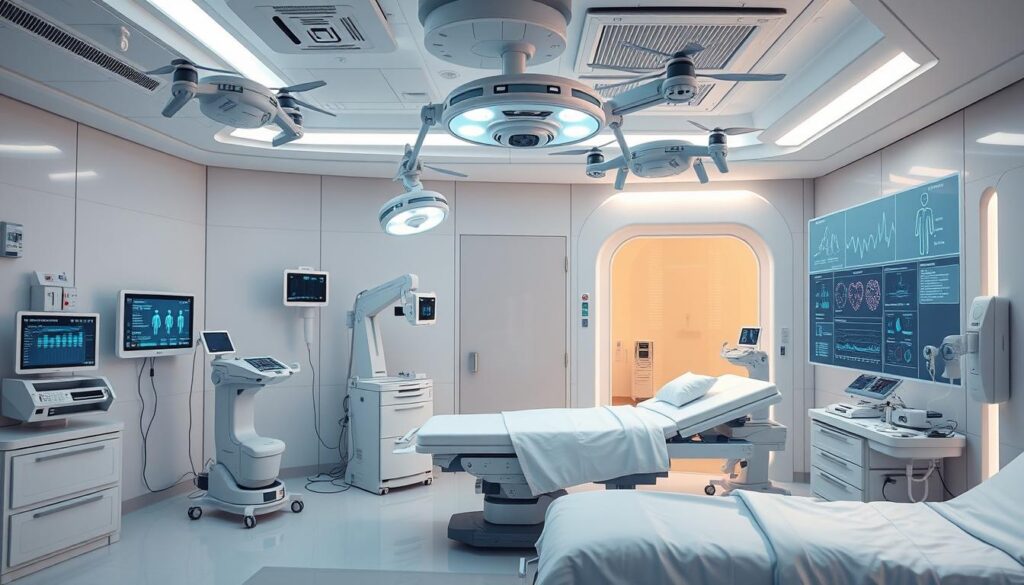- Medical technology is changing fast, thanks to new tools like artificial intelligence and wearable devices. These tools are making healthcare better and more personal. They help doctors make accurate diagnoses and treat patients in new ways.
But, we also need to think about keeping patient data safe and using technology fairly. It’s important to make sure everyone has access to these new technologies. This way, healthcare can keep getting better for everyone.
Key Takeaways :Medical Technology
- Rapid advancements in medical technology are revolutionizing healthcare delivery and patient care.
- Emerging technologies like AI, ML, IoMT, and wearables offer new opportunities to enhance diagnosis, personalize treatments, and improve outcomes.
- Addressing data privacy, ethical AI use, and equitable access to medical technologies are crucial considerations for the future.
- The medical technology industry is poised for continued growth, driven by factors like miniaturization, cost reduction, and profit motives.
- Patients should remain at the center of healthcare as technology evolves to meet both health and economic needs.
Medical Technology: Driving Transformation in Healthcare
Digital technology, artificial intelligence (AI), and machine learning (ML) are changing healthcare. AI and ML can solve big problems, make things run smoother, and make patients happier. They help with everything from making diagnoses to planning treatments.
Artificial Intelligence and Machine Learning
AI and ML are becoming key in healthcare. They help doctors make better diagnoses and create treatment plans that fit each patient. These technologies look at lots of data to find patterns and offer insights. This helps doctors make better choices and improves patient care.
AI and ML can spot diseases early and help find new medicines. They are changing how doctors work.
Internet of Medical Things and Wearable Devices
The Internet of Medical Things (IoMT) and wearable devices are changing healthcare too. These devices let doctors check on patients from afar. They can see how patients are doing, how active they are, and if they’re taking their medicine.
This helps patients take care of themselves better. It also makes healthcare easier for everyone.
But, we need to make sure these new tools are safe and work right. We must protect patient data and keep healthcare systems secure.
Trend Impact Benefits Artificial Intelligence and Machine Learning Improved diagnostic accuracy, personalized treatment plans, and predictive analytics Enhanced decision-making, optimized drug development, and early disease detection Internet of Medical Things and Wearable Devices Real-time remote patient monitoring and preventive care Empowered patient engagement, reduced healthcare costs, and improved patient outcomes As healthcare keeps using these new technologies, the future looks bright. Care will be more efficient, tailored to each person, and focused on the patient.
Enhancing Patient Care with Advanced Technologies

The COVID-19 pandemic has made telemedicine and remote patient monitoring more common. These technologies help patients in remote areas get specialist care. They can change how healthcare is delivered, helping manage chronic conditions better and improving patient care results.
Telemedicine and Remote Patient Monitoring
Telemedicine and remote patient monitoring are changing healthcare. They let patients get medical help at home, cutting down on in-person visits. This is especially good for those in remote or underserved areas.
Studies show that using Computerized Patient Order Entry (CPOE) systems can lower serious errors. A study on deprescribing software found a 78% increase in successful discontinuations. This shows quick and lasting positive results.
Virtual and Augmented Reality in Healthcare
Virtual reality (VR) and augmented reality (AR) are big in healthcare now. They’re used in education, pain management, and rehab. These technologies are changing how care is given and letting patients take a bigger role in their health.
A study found 20% of duplicate medication orders were due to tech issues. High alert override rates in CDS systems are also a concern. This highlights the need for better alert design to avoid fatigue.
In 2022, making CDS systems easier to use was a big focus. The goal was to fit into existing workflows and reduce the burden on clinicians. A review found CPOE can lower preventable drug errors and medication mistakes in hospitals.
Personalized Medicine and Genomics: The Future of Targeted Therapies

Genomics is changing healthcare by making treatments more personal. Doctors can now tailor treatments based on a person’s genes. This makes treatments more effective and reduces side effects, changing how we treat diseases.
Genomics also helps find diseases early and prevent them. This shift from treating diseases after they start to preventing them is a big step forward. It promises better health outcomes and a new way of looking at healthcare.
The human genome is complex, with 19,370 genes and over 14,000 pseudogenes. But new genetic testing technologies like whole genome sequencing (WGS) and targeted gene panels are helping. These tools give doctors the genetic information they need to make better treatment choices.
Genetic Testing Technology Advantages Disadvantages Whole Genome Sequencing (WGS) Comprehensive coverage of the entire genome, including coding and non-coding regions. Higher cost and longer analysis time compared to other methods. Whole Exome Sequencing (WES) Focuses on the protein-coding regions of the genome, which are more directly linked to disease-causing variants. May miss variants in non-coding regions that could also be clinically relevant. Targeted Gene Panels Cost-effective and efficient for analyzing a specific set of genes associated with a particular disease or condition. Limited to the genes included in the panel, potentially missing other potentially relevant genetic variations. Genomic technologies are changing how we diagnose and treat diseases. Genetic testing is becoming more common. Soon, whole genome sequencing might be part of regular healthcare.
As we learn more about the human genome, personalized medicine and targeted therapies will change healthcare. They promise treatments that are more effective and tailored to each person. This is a new era of healthcare that focuses on prevention and personalization.
“Genomic medicine has the potential to revolutionize healthcare by offering prompt and accurate diagnoses, risk stratification based on genotype, and personalized treatments for individuals with rare diseases or cancer.”
Securing and Streamlining Healthcare with Emerging Technologies

Emerging technologies are changing healthcare in big ways. They’re making data safer, processes more efficient, and care better for patients. Blockchain and robotics are leading this change.
Blockchain in Healthcare
Blockchain makes healthcare data safe and clear. It creates unchangeable, shared patient records. This lets doctors and nurses easily share and access information.
It also helps with claims, tracking supplies, and managing clinical trials. This reduces mistakes and makes healthcare better.
Robotics and Automation in Healthcare
Robotics and automation are changing healthcare in many ways. They help with surgeries, make admin tasks easier, and clean hospitals. Robots do precise surgeries, cutting down on risks and improving results.
Automation also cuts down on mistakes and makes things more efficient. This lets doctors and nurses spend more time on patient care.
The global healthcare IT market was worth $199.5 billion in 2023. It’s expected to grow 18.7% each year until 2030. This growth is driven by more smartphone use, remote monitoring, and better IT.
As these technologies improve, they’ll make healthcare safer and more efficient. This will lead to better care for patients and a more effective healthcare system.
“Emerging technologies are not only transforming patient care but also streamlining healthcare operations and improving data security.”
Predictive Analytics and Mental Health Care: Proactive Approaches

The healthcare world is changing fast, thanks to predictive analytics. This technology is changing how we care for mental health. It lets doctors and nurses give care that’s more personal and proactive.
Predictive analytics uses data to guess health outcomes and spot risks. This helps healthcare teams catch mental health issues early. It leads to better health and saves money too.
Digital tools are also making mental health care easier to get. People can now get help from home. This makes it easier for them to manage their mental health.
By using predictive analytics and digital tools, care becomes more complete. This approach not only helps patients but also makes healthcare more sustainable.
Predictive Analytics in Mental Health Care Benefits Identifying high-risk patients for mental health conditions Enables earlier intervention and preventive care Forecasting patient outcomes and treatment effectiveness Improves care planning and decision-making Predicting suicidal behavior and suicide risk Saves lives and reduces healthcare costs Optimizing resource allocation and care coordination Enhances efficiency and cost-effectiveness The future of healthcare looks bright with predictive analytics and digital tools. These technologies will help make care more personal and effective. They will improve the health and well-being of many people.
Also Read : How Does Technology Help In Surgery?
Conclusion: Embracing the Future of Healthcare Technology
The healthcare world is on the verge of a big change. This change comes from fast progress in medical technology. New things like artificial intelligence, telemedicine, personalized medicine, and blockchain are coming. They promise to make patient care better, make things run smoother, and lead to better health results.
As these technologies keep getting better, it’s key for everyone in healthcare to get on board. This means healthcare providers, those making policies, and the whole industry need to work together. They must tackle issues like keeping data safe, using AI the right way, and making sure everyone can use these technologies.
A report by HIMSS shows that almost all health system leaders in the U.S. and abroad want to invest in digital transformation. By 2026, the top healthcare AI apps could be worth $111 billion, says Statista. With healthcare tech spending set to hit $3.4 trillion by 2026, it’s clear that the future of healthcare is tied to these technologies.
Working together, we can make healthcare better, more accessible, and tailored to each person. This will lead to better health for people all over the world. Healthcare workers and leaders need to keep up with the latest technology trends in healthcare. They must embrace the future of healthcare technology to open up new chances and bring about good changes in this important field.
FAQs
Q: What role does medtech play in the future of medical technology?
A: Medtech is pivotal in driving innovation within the medical technology industry, providing advanced medical devices and diagnostics that enhance the quality of life for patients worldwide.
Q: How are innovations in medical devices improving diagnostics?
A: Innovations in medical devices are leading to the development of more accurate and efficient diagnostic tests, which help healthcare professionals detect diseases earlier and more effectively, ultimately improving patient outcomes.
Q: What is the significance of forums like Advamed in the medical device industry?
A: Forums like Advamed serve as a hub for medical technology companies to collaborate, share knowledge, and discuss policies that impact the medical device industry, fostering innovation and improving regulatory processes.
Q: How does digital health fit into the landscape of medical technology?
A: Digital health integrates technology with healthcare services, enhancing the capabilities of medical devices and providing innovative solutions for patient monitoring, data collection, and diagnostics.
Q: What are some examples of advanced medical imaging techniques?
A: Advanced medical imaging techniques include MRI, CT scans, and PET scans, which are crucial for accurate diagnostics and are continually evolving due to innovations in imaging technology.
Q: How do reimbursement policies affect the medical device industry?
A: Reimbursement policies significantly influence the medical device industry by determining how healthcare providers get compensated for using medical devices and diagnostics, impacting their adoption and innovation.
Q: What types of medical devices help improve surgical outcomes?
A: Medical devices such as implantable pacemakers, surgical instruments, and advanced imaging apparatus are designed to assist in surgical procedures, ensuring better outcomes and enhancing the capabilities of surgeons.
Q: Why is the regulatory environment essential for medtech companies?
A: The regulatory environment is crucial for medtech companies as it ensures that medical devices meet safety and efficacy standards, which is vital for gaining market approval and maintaining public trust in the medical technology industry.
Q: How can innovations in vitro diagnostics impact patient care?
A: Innovations in vitro diagnostics provide healthcare professionals with the best tools to diagnose conditions accurately and rapidly, enabling timely treatment decisions that can significantly improve patient care.
Q: What is the future outlook for the medical technology industry?
A: The future of the medical technology industry appears promising, with ongoing innovations expected to enhance diagnostics, treatment options, and the overall efficiency of healthcare services, ultimately leading to better patient outcomes.
Source Links
- https://www.ncbi.nlm.nih.gov/pmc/articles/PMC4147743/
- https://www.linkedin.com/pulse/evolution-future-healthcare-technology-trends-deep-dive-burak–ecogc
- https://www.advamed.org/2024/03/12/medtech-shaping-a-new-era-in-patient-care/
- https://www2.deloitte.com/us/en/pages/operations/articles/digital-transformation-medical-device-industry.html
